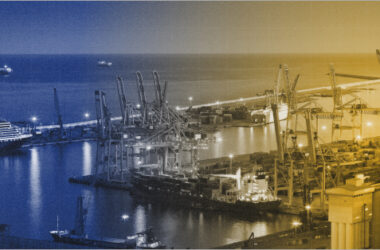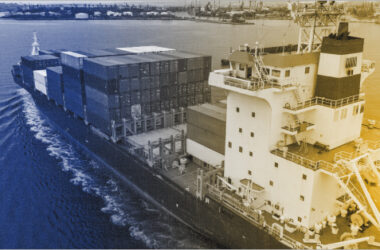Shipping goods across India and internationally involves inherent risks. From natural disasters and accidents to theft and mishandling, unforeseen events can disrupt the smooth flow of your supply chain and cause significant financial losses. Marine Single Transit Insurance provides a crucial safety net, protecting your valuable cargo throughout its journey. However, with a multitude of Marine Insurance Policy providers in India, choosing the right partner can seem overwhelming. This blog will guide you through the key considerations and provide valuable insights to help you select the most suitable insurance company for your Single Transit Insurance needs.
How to Choose the Right Insurer for Your Single Transit Policy?
Here’s a step-by-step guide to help you choose the right insurance provider for your Single Transit Insurance Policy:
- Understand Your Business Needs
Before approaching an insurance company, take stock of your specific requirements:
- Nature of Goods: Are you transporting perishable items, heavy machinery, or high-value goods? The type of cargo significantly affects the marine insurance policy terms.
- Mode of Transport: Is your business reliant on roadways, railways, air, or sea? Single transit policies can differ based on the mode of transit.
- Frequency of Shipments: If you frequently transport goods, you might want to consider an open policy. For occasional shipments, a single transit policy is more economical.
Understanding these factors helps narrow down the companies that specialize in your specific needs.
- Evaluate the Insurance Company’s Reputation
The reputation of a Marine Insurance Policy provider is a crucial factor. Here’s how you can assess it:
- Check Reviews and Ratings: Look for online reviews and ratings on platforms like Google and IRDAI’s official website.
- Word of Mouth: Ask industry peers about their experiences with specific insurers.
- Awards and Recognition: Companies with industry accolades are often more reliable.
Well-reputed insurers are more likely to offer transparent single transit policies and have streamlined claims processes.
- Ensure the Financial Stability of the Insurer
The financial health of the insurance company is an essential indicator of its ability to settle transit insurance claims. To assess this, check the following:
- Solvency Ratio: Check the insurer’s solvency ratio, which indicates its financial capacity to handle single transit insurance claims. IRDAI mandates a minimum solvency ratio of 1.5 for Indian insurers, ensuring they have enough capital to cover claims.
- Annual Reports: Review the company’s annual financial statements for insights into profitability and claim settlement history.
A financially stable insurer ensures that transit insurance claims are processed without delays, even during widespread disasters.
- Analyse Single Transit Policy Coverage and Features
The core of any insurance policy is the coverage it offers. Compare different insurers based on the following factors:
- Extent of Coverage: Does the single transit policy cover risks like theft, fire, natural disasters, piracy, and accidental damages?
- Add-Ons: Look for additional coverage options such as war risk, strike, or delay in transit coverage.
- Exclusions: Carefully read the single transit policy exclusions to avoid surprises during claim settlement.
Choose a transit policy in Marine Insurance that provides comprehensive coverage while being cost-effective.
- Compare Single Transit Policy Premium Costs
While affordability is important, the cheapest transit insurance policy might not always be the best. Strike a balance between cost and single transit policy coverage:
- Premium Calculation: Premiums for single transit policies are influenced by factors such as the value of goods, mode of transport, distance, and destination (domestic or international).
- Customisable Plans: Opt for insurers that offer flexibility in premium payments and tailor-made plans for your business.
- Discounts: Some companies offer discounts for bundling single transit policies or for consistent no-claim years.
Remember, paying slightly more for better single transit policy coverage and service can save you significant costs in the long run.
- Assess the Claims Settlement Process
One of the most critical aspects of choosing an insurance company is its claims settlement process. A cumbersome or slow process can nullify the benefits of the single transit policy in Marine Insurance. Evaluate:
- Claim Settlement Ratio (CSR): A higher CSR indicates that the insurer settles most claims without dispute.
- Ease of Filing Claims: Look for companies with simple and digital-friendly claim procedures.
- Turnaround Time (TAT): Assess the average time taken by the insurer to settle claims.
A transparent, fast, and efficient claims process ensures minimal disruptions to your business.
- Check Customer Service Quality
A reliable insurance company will have excellent customer support. Consider the following:
- Availability: Is their customer service team accessible 24/7?
- Communication Channels: Do they offer multiple channels like phone, email, and live chat?
- Responsiveness: How quickly do they address queries or resolve complaints?
Good customer service can make a significant difference during emergencies.
- Verify Legal and Regulatory Compliance
Ensure that the insurer operates under the guidelines set by the Insurance Regulatory and Development Authority of India (IRDAI). Check for:
- License: Verify that the company is registered with IRDAI.
- Policy Documentation: Ensure that the single transit policy terms are clearly stated, and no hidden clauses exist.
A compliant insurer guarantees adherence to ethical practices and regulatory standards.
- Explore Digital Capabilities
In today’s digital age, having an insurer with robust online services can simplify your experience. Look for:
- Policy Purchase and Renewal: Can you buy or renew single transit policies online without hassles?
- Claim Tracking: Does the insurer provide real-time updates on transit policy claim status?
- Mobile Apps: A user-friendly mobile app can make it easier to manage your single transit policy in marine insurance on the go.
Digital-first insurers often offer faster service and better customer satisfaction.
- Seek Expert Advice
If you are unsure about your choices, consulting an insurance broker or advisor can help. They can:
- Compare single transit policies from different insurers.
- Highlight the pros and cons of each single transit policy.
- Offer recommendations based on their expertise and experience.
A broker acts as a bridge between you and the insurer, ensuring your interests are protected.
Who Should Purchase a Marine Single Transit Insurance Policy?
A marine single transit policy is ideal for individuals and businesses that need to safeguard their goods against risks like theft, damage, fire, or natural calamities during transportation. Below are the key categories of individuals and organizations that should consider purchasing a single transit policy:
- Manufacturers
Manufacturers often need to transport raw materials to their factories or ship finished products to distributors or customers. Given the value of the goods and the potential risks during transit, Marine Single Transit Insurance is critical for:
- Protecting raw materials transported from suppliers.
- Covering finished goods sent to distributors or clients.
- Exporters and Importers
For businesses engaged in international trade, the risks associated with transporting goods over long distances are higher. Exporters and importers benefit from:
- Export Coverage: Protecting goods shipped to foreign buyers.
- Import Coverage: Securing raw materials or products being imported for domestic use or resale.
- Traders and Retailers
Traders and retailers who frequently move goods between locations—such as warehouses, retail outlets, or between cities—need this policy to:
- Mitigate risks during domestic transit.
- Ensure smooth operations even in the event of damage or delays.
- Logistics and Transportation Companies
Logistics providers and transport operators are responsible for the safe delivery of goods. A Single Transit Insurance Policy helps these companies:
- Protect client goods under their custody.
- Build trust with customers by ensuring compensation for unforeseen losses.
- E-commerce Businesses
E-commerce companies rely heavily on the safe and timely delivery of products to customers. They can benefit from a single transit policy to:
- Cover high volumes of shipments, especially during sales and festive seasons.
- Protect goods from damages or losses caused by mishandling or transit accidents.
- Small and Medium Enterprises (SMEs)
SMEs that occasionally transport goods but lack the resources for comprehensive annual insurance policies find Single Transit Insurance especially useful. It provides:
- Affordable, trip-specific coverage.
- Flexibility for businesses with irregular shipping needs.
- Agricultural Producers and Distributors
Farmers and agribusinesses transporting perishable or high-value goods like grains, fruits, or vegetables can secure:
- Coverage against spoilage due to delays or weather conditions.
- Protection from losses caused by accidents during transport.
- Freight Forwarders
Freight forwarders handling goods on behalf of other businesses can use a single transit policy to:
- Safeguard their liability for the goods in transit.
- Ensure business continuity in case of unexpected losses.
- Event Organisers and Exhibitors
Individuals or companies transporting valuable items like equipment, display materials, or merchandise for events and exhibitions should purchase this policy to:
- Cover potential damage or loss during transit to and from the venue.
- Protect against risks such as theft, mishandling, or accidents.
- Individuals Moving Valuables
Individuals occasionally transporting valuable personal items such as artwork, antiques, or jewelry can benefit from this policy to:
- Secure their possessions during a one-time shipment.
- Avoid financial loss from theft or damage.
Final Thoughts:
Choosing the right insurance company for your Single Transit Insurance policy is not just about securing your goods—it’s about safeguarding your business’s reputation and finances. By understanding your requirements, evaluating insurers on key parameters, and seeking expert advice when needed, you can make an informed decision. Remember, the right policy from a reliable insurer provides peace of mind, allowing you to focus on growing your business without worrying about unforeseen transit risks.








